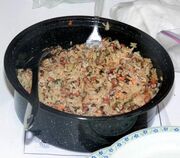Paul Hedrick (talk | contribs) mNo edit summary |
m (→Climate, Culture, and Special Considerations: Cat change) |
||
| Line 10: | Line 10: | ||
{{CountryContacts}} |
{{CountryContacts}} |
||
[[Category:South America]] |
[[Category:South America]] |
||
| − | [[Category:Countries |
+ | [[Category:Countries]] |
[[Category:{{PAGENAME}}]] |
[[Category:{{PAGENAME}}]] |
||
Revision as of 06:08, 29 July 2011
Events
News and Recent Developments

Solar prepared meal at the 2009 Crisis Management IV experiment in Georgetown
- April 2010: Solar Cookers International (SCI) board member Patricia McArdle was invited by the U.S. Southern Command (SOUTHCOM) to participate in the 2009 Crisis Management IV experiment in Georgetown, Guyana. This annual series of experiments explores new technologies that are beneficial and easily transferable to partner nations in Latin America. The focus of this year’s experiment was flood management. Though susceptible to flooding every few years, Guyana has abundant sunshine for solar cooking, even during the rainy season. As part of the SOUTHCOM program, McArdle gave a solar cooking presentation to officials of the Guyana Civil Defense Commission. She left a number of solar cooking kits with the officials for use in future demonstrations. McArdle also organized and supervised an integrated solar cooking competition between two teams of students from the University of Guyana’s School of Earth and Environmental Sciences. The purpose of the competition was to demonstrate the capability of the solar CooKit — SCI’s simple cardboard solar cooker — to cook traditional local dishes using only sunlight. The students were split into teams, and cooked two versions of “cook-up,” one with black-eyed peas and one with split peas. They were also required to pasteurize drinking water using the CooKits, and confirm pasteurization temperatures using a Water Pasteurization Indicator (WAPI). The meals were tasted and judged by a number of local officials. The winners received CooKits and pots. The students immediately began planning for future demonstrations, including one at a regional Scout Jamboree. A front-page article in the Stabroek News had this to say about the solar cooking competition: “While some persons were hesitant to sample the two [cook-up] varieties, it was unanimously agreed that the popular dish turned out to be quite tasty.” McArdle organized a similar program for the 2008 Crisis Management III experiment in Tegucigalpa, Honduras.
Climate, Culture, and Special Considerations
Contacts
The entities listed below are either based in Guyana, or have established solar cooking projects there:
SCI Associates
- Main article: Solar Cookers International Association
